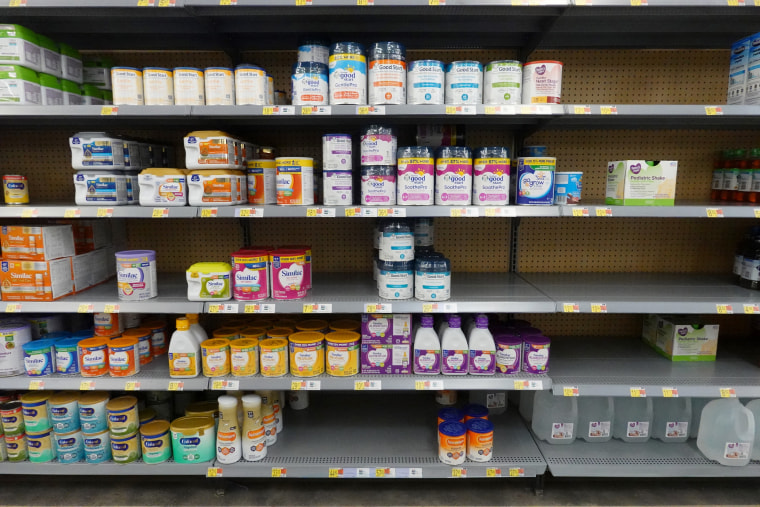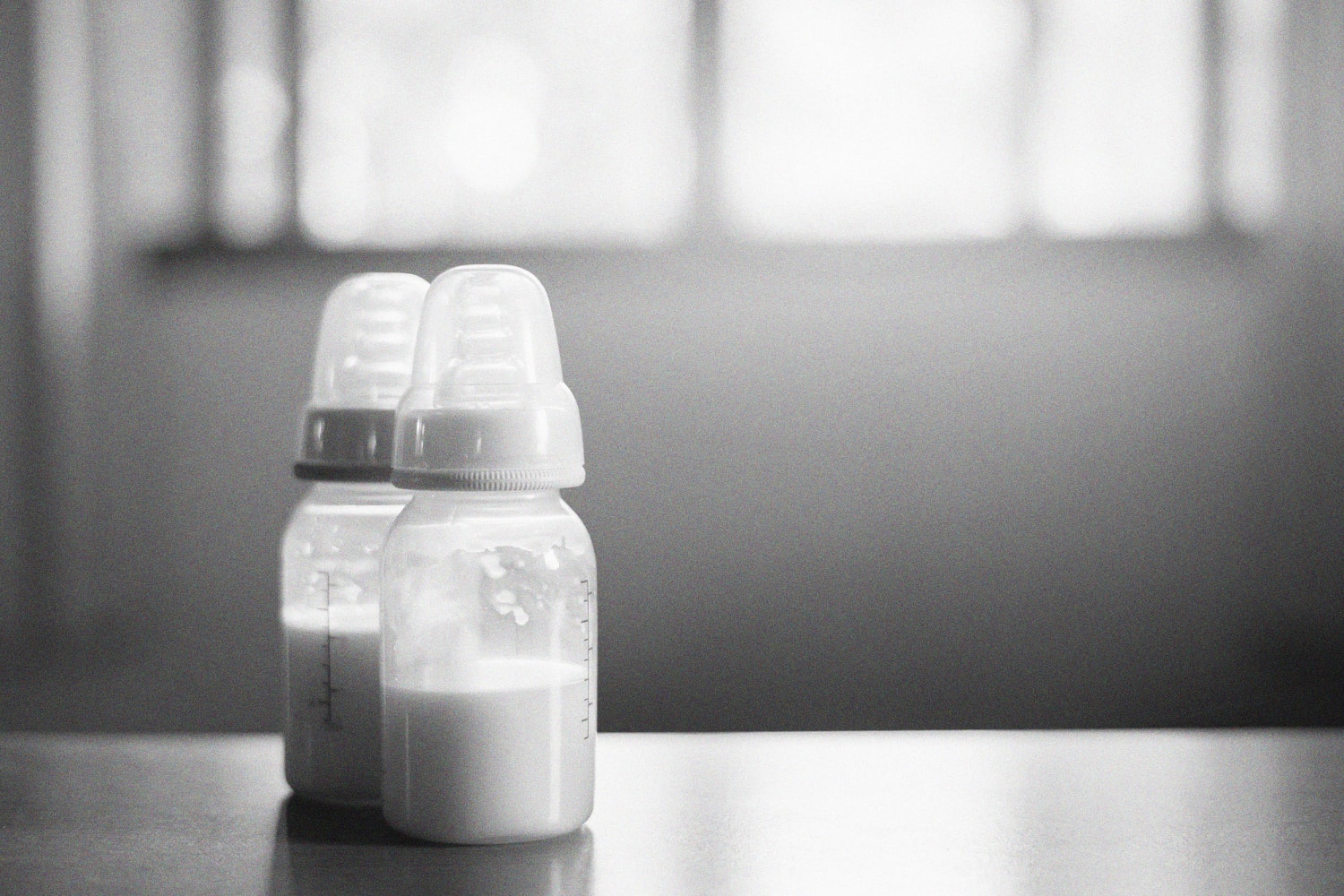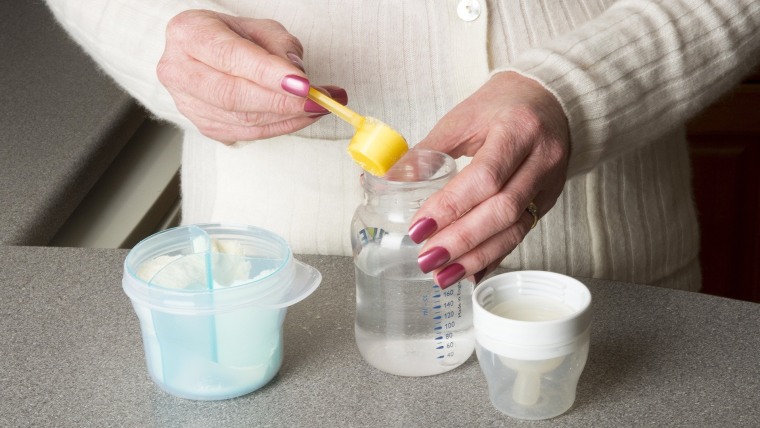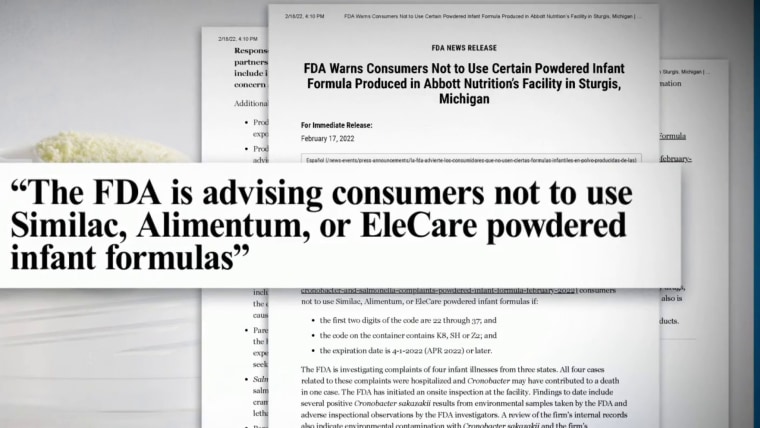Amid a nationwide baby formula shortage, federal investigators have been unable to definitively determine the source or sources of a rare bacteria that sickened four infants, two of them now dead, who all consumed powdered formula made at one Michigan factory.
Abbott Nutrition’s factory in Sturgis, Mich., halted production of Similac earlier this year amid reports of Cronobacter infection in the four infants, who had all ingested powdered formula from the plant, but the Centers for Disease Control and Prevention and the Food and Drug Administration told NBC News they found no match between bacteria samples taken from two of the infants and samples from the factory.
CDC officials also said, however, that they could not obtain or test samples from the two other infants who got Cronobacter infections and had consumed formula from the factory.
Abbott Nutrition and the FDA, which is investigating conditions at the plant, declined to say if additional cases had surfaced besides the four already reported. Cronobacter infections are rare, but can be deadly in newborns. The germs can cause sepsis, a dangerous blood infection or meningitis. Two of the four infants with reported Cronobacter cases died.
Members of Congress have raised concerns the FDA acted too slowly in response to the cases.
FDA officials told NBC News the investigation into factory conditions is ongoing and has “many moving parts,” but declined to answer questions from NBC News about the investigative timeline.
Abbott Nutrition voluntarily issued a recall on Feb. 17 after infant sicknesses were reported.
Production at the Michigan factory, which makes three of the country’s most popular brands, Similac, Alimentum and EleCare, was halted and remains paused.
Abbott said in a statement that it “continue[s] to enhance our manufacturing and quality processes to ensure that our products remain free of Cronobacter Sakazakii” and has “already begun implementing corrective actions and enhancements at the facility.”
The company added that the lack of a genetic match between sick infants and the formula confirmed its own internal testing showing there was no link and said it has not found the bacteria in any of its distributed products. The company says it is also working with the FDA to address findings from the inspections.
Cronobacter can be introduced into baby formula in different ways, according to the CDC, including after a container has been opened by the end user.
Abbott’s pause in production has exacerbated what was already a shortage of formula due to supply chain issues.

More than 30 percent of the most popular formulas were out of stock across the U.S. last week, according to an analysis by the firm Datasembly, which tracked the supply at more than 11,000 stores. Walgreens is now limiting shoppers to three purchases of infant and toddler formula per transaction because of “increased demand and various supplier issues,” according to the company.
The recall
In February, the FDA and the CDC reported that four infants had gotten sick with Cronobacter. All four infants consumed powdered infant formula from the Sturgis facility, according to the CDC.
CDC typically receives reports of two to four Cronobacter infections per year, and an FDA spokesperson says concerns were raised when FDA personnel realized all four infants had consumed powdered formula from the same factory.
When the FDA inspected the facility between Jan. 31 and March 18 in response to the cases, inspectors found the factory failed to “establish a system of process controls covering all stages of processing” to prevent contamination.
According to the inspection report, the FDA and Abbott “found evidence of Cronobacter” in the “powdered infant production environment.”
This was not the first time the bacteria had been discovered at the plant.
Company records indicated that Abbott’s own tests had detected Cronobacter in areas of infant formula production eight times between fall 2019 and February 2022 and another 20 instances in February, though not in the formula itself, according to the report.
Abbott also identified Cronobacter in finished formula in September 2019 and June 2020. The company says those lots were destroyed and never distributed to customers.
The FDA inspection report also referenced how the company had apparently deviated from its own standard operating procedure.
Inspectors noted there had been a consumer complaint related to one of the two fatal cases of infants who contracted Chronobacter and consumed baby formula. The report said that the Abbott team “did not request” in response to the complaint that samples from the same lot of formula the infant consumed be tested in apparent deviation from company procedure.
Abbott told NBC News it had tested that lot of formula during the FDA inspection earlier this year and the lot had been negative for the bacteria.
An earlier inspection of the plant in September 2019 also found that Abbott “did not test a representative sample” of powdered infant formula to meet the company’s “microbiological quality standards” before distribution. Following discussion with the FDA, Abbott says it updated its protocols to test from a larger number of containers.
House Appropriations Committee Chair Rosa DeLauro, D.-Conn., asked the Office of the Inspector General for the Department of Health and Human Services to investigate whether or not the FDA, a subagency of HHS, took appropriate and effective action. A spokesperson for the inspector general says the request is being reviewed.
As a result of the recent illnesses, the FDA said it intends to engage with CDC and state partners about the possibility of adding Cronobacter to the list of nationally notifiable diseases like salmonella.
Only one state, Minnesota, currently requires medical providers to report instances of Cronobacter to public health officials.
Once the FDA finishes its investigation into the Michigan facility, agency officials say it will “conduct a programmatic review to ensure the maximum effectiveness of agency programs and policies related to infant formula and special medical food complaints, illnesses, and recalls.”
How to avoid Cronobacter
CDC officials say these incidents of Cronobacter infection provide a good opportunity to remind parents how to avoid Cronobacter infections and how to prepare and store infant formula correctly.
Cronobacter is found naturally in the environment and can live in dry foods, including powdered formulas, powdered milk and starches, according to the CDC.
They say mothers should breastfeed if possible, as infections are even more rare among infants who are breastfed. All baby bottles and breast pump parts should be cleaned and sanitized.
Liquid formula could be an option, although it’s typically more expensive.
If parents are using powdered formula, they should be sure to wash their hands and keep lids and scoops clean. Containers should be closed quickly after use. Leftover formula should be put in the refrigerator or thrown away after 24 hours.
If consumers want to see if a formula has been recalled, they can check the company’s website.
Source: | This article originally belongs to Nbcnews.com











